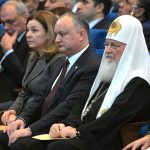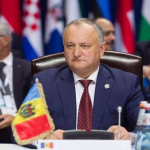ROMANIA MONITOR
Date: 25 February 2019
Referendum And Elections. Double Voting in Moldova
The victory of socialists, but without the majority allowing for independent governance. Last Sunday, residents of the Republic of Moldova with a 3.5-million population took part in parliamentary elections. At the opportunity, a referendum in which people voted for and against the decrease in the number of parliamentarians and the possibility to revoke them in case of failure to fulfil their obligations was organised.

Representatives of fourteen parties run for elections. 2.8 citizens of Moldova were entitled to voting. Many exercised the right abroad – even 800 thousand Moldovans may live only in Russia. Eventually, the turnout amounted to little less than 50%, but low interest in politics among the youngest residents of Moldova is shocking. Only 8% of people of the age 18-25 participated in the elections.
Eventually, four parties enter the parliament. The currently ruling Democratic Party of Moldova (Partidul Democrat din Moldova; PDM) connected with oligarch Vlad Plahotniuc with the support of over 23.6% gained 30 mandates, which means an increase by 11 representatives. However, the Party of Socialists of the Republic of Moldova (Partidul Socialiştilor din Republica Moldova; PSRM) turned out to be the winner. 31% of votes translated to 34 seats in the parliament (an increase by 9). The current, pro-Russian President of Moldova, Igor Dodon, comes from this party.
The recently established Acum (Now) bloc by DA (Demnitate și Adevăr, Dignity and Truth) and PAS (Acțiune și Solidaritate; Party of Action and Solidarity) parties gained more votes than PDM (almost 27%). However, for the first time, the elections have been held in the mixed system – 50 MPs were chosen from party lists, and 51 in the single-mandate constituencies. For the right-centre coalition, a better score resulted in 27 MPs. Seven representatives of Șor party also entered the parliament. The grouping is named after its leader, Ilan Șor – right-wing, pro-Russian politician and businessman.
Communists, who were previously represented by 21 MPs, are the biggest losers of the elections. This time, they did not even manage to reach the election threshold. The liberal party, which earlier had 13 MPs, also left the Moldovan political scene.
In order to have the majority, the winning socialists need an ally. Șor seems to be the most probable candidate to establish a coalition, but even in such a situation, both parties have jointly only 41 out of 101 seats. Therefore, it is possible that a coalition consisting of the currently ruling Democratic Party of Moldova and DA and PAS in tandem, which have the support of the electorate not satisfied with the situation in the state, will be established. Such a coalition would allow achieving the majority of 57 MPs. This political situation is disturbed by the fact that neither socialists, nor representatives of Acum want to form a coalition. There are views that in such a situation early elections may be called.
Except for voting in the elections, Moldovans also participated in a referendum in which they answered two questions. The first one concerned the decrease in the number of parliamentarians from 101 to 61. The second regarded the possibility of revoking deputies who do not fulfil their duties properly. In both cases, there were three times more proponents than opponents of changes.
The course of elections was monitored by almost 2.5 thousand local observers, and 7 hundred from abroad. Despite the fact that they did not raise any significant reservations, there are voices about incidents of malpractice. For example, vote buying was allegedly reported in polling stations on the territory of the Pridnestrovian Moldavian Republic. Supporters of Plahotniuc were supposed to be responsible for such practice. The matter is complicated by the fact that for the first time there was no election silence but only agitation in polling stations was banned.
_________________________________
All texts published by the Warsaw Institute Foundation may be disseminated on the condition that their origin is credited. Images may not be used without permission.














